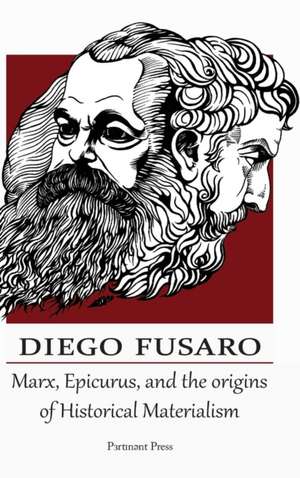Marx, Epicurus, and the Origins of Historical Materialism
Autor Diego Fusaroen Limba Engleză Hardback – 14 mar 2018
Marx employed Epicurus' critical stance toward Plato and Aristotle as an excuse, as it were, to drop not-so-subtle hints about the philosophy and politics of the Germany of his day.
Fusaro, described by the influential paper La Repubblica (July 2013) as possibly the "brightest star in the Italian philosophical firmament of our times", employs Marx's critique of the German present of Marx's time to propose a critique of our own times, a critique of economic libertarianism and moral libertinism.
Fusaro's underlying argument seems to be that we live in times that are nothing but Epicurean, in which dogmatic and hedonistic liberalism dominates our lives, as pens e unique.
This monograph combines a twofold approach: the exoteric and the esoteric. Exoterically, it analyses of the long-ignored University dissertation of the young Karl Marx and the influences of Greek Atomism on the molding of Marx's thought system. Esoterically, or by implication, it analyses our contemporary world.
Preț: 468.44 lei
Nou
Puncte Express: 703
Preț estimativ în valută:
89.64€ • 94.02$ • 74.62£
89.64€ • 94.02$ • 74.62£
Carte tipărită la comandă
Livrare economică 01-15 aprilie
Preluare comenzi: 021 569.72.76
Specificații
ISBN-13: 9781912142156
ISBN-10: 1912142155
Pagini: 178
Dimensiuni: 161 x 240 x 14 mm
Greutate: 0.44 kg
Editura: The Pertinent Press
ISBN-10: 1912142155
Pagini: 178
Dimensiuni: 161 x 240 x 14 mm
Greutate: 0.44 kg
Editura: The Pertinent Press
Notă biografică
Diego Fusaro (Turin, Italy, 1983) teaches History of Philosophy at the Institute for Higher Strategic and Political Studies, Milan, Italy. He writes for the Italian newspapers La Stampa and Il Fatto Quotidiano and makes frequent appearances on Italian TV. Whereas Enrico Galavotti, in his Esegeti di Marx (2015), describes Diego Fusaro as 'the rising star of contemporary Italian Marxist philosophy', Fusaro defines himself as an 'independent disciple of Hegel and Marx'.
